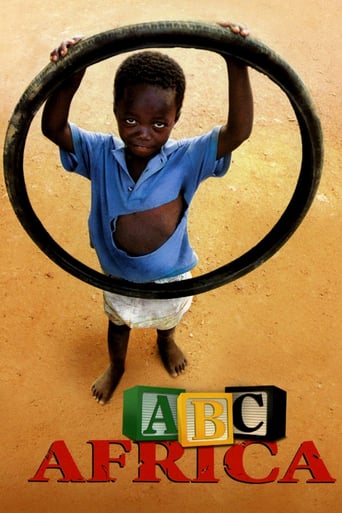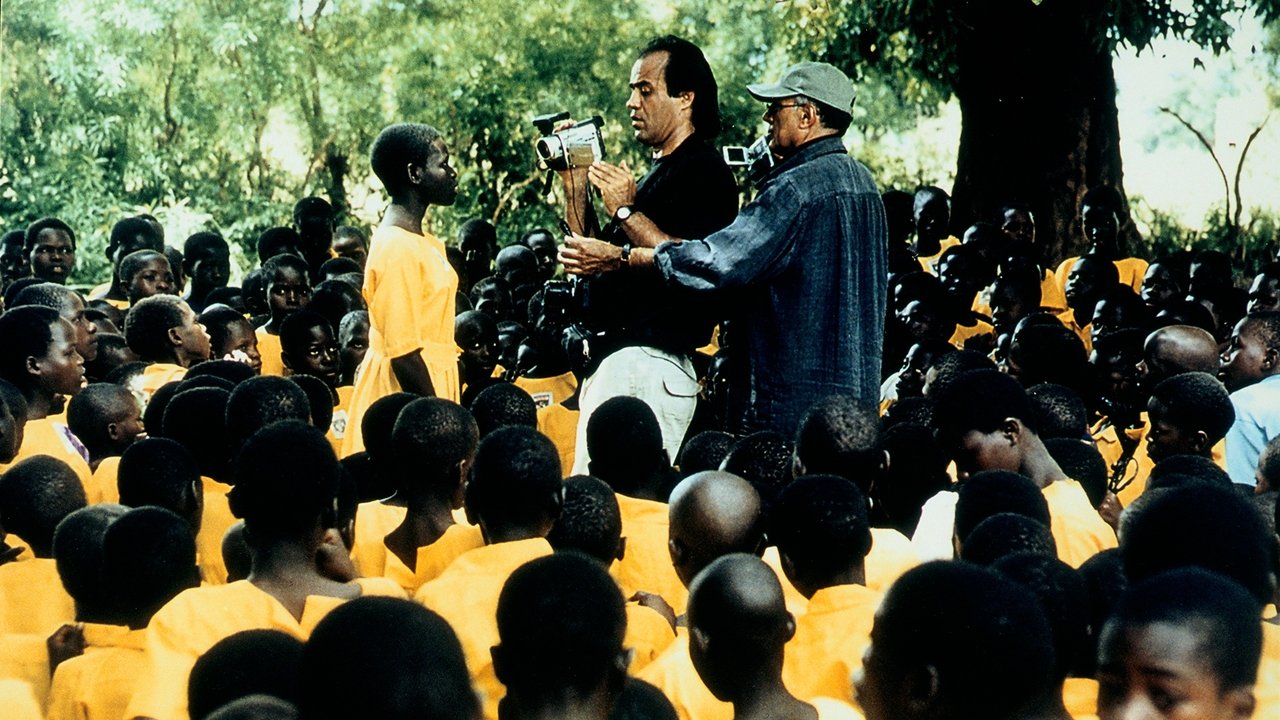bojleng_utomo
With all those (accidentally) minimized gadgets and plans, this movie is quite unusual. It is also not a very common practice (albeit not very unusual) that the director seems really willing to refrain himself from speaking through his movie. He wants the movie speaks for itself. And here, it does.Nevertheless, its not that easy to grasp what this movie is really trying to say.Let's try to take a good look at one piece of the puzzle.The adopting parents bring the little girl to a traditional market (that's what the story goes) so that she will not be removed from her root. Then we see the market.Now that is Beautiful (capitalization intended). This invaluable (local) 'collective awareness' about one's own identity is one too many times proved to be some 'intangible' (that is, somehow out of reach) idea to its own stakeholders (the very people who need it most). And here we see a couple (some outsiders) who care.But hey, where is the little girl? We see the market alright, but not the girl. Yes, we see her in the protective comfort (and luxury, if we consider the environment) of a starred hotel's restaurant (?), in the car, or even on aeroplane. But not in that so called market they're talking about.This 'eyebrow-raising beauty' is, in a way, somewhat loosening the movie's grip on truthfulness--assuming that it does really matter here (please, I'm NOT implying that anybody is being cheaty, I'm only saying what this fragment MIGHT look like--presented this way). We see that somewhere--sometimes, the movie relies too much on hearsay or telltale. So, even if the motifs might be remarkable, the execution (that is, the filming) is ARGUABLY not.Interestingly, this could come from the fact that Kiarostami doesn't want to film a made-up thing (not even for the movie's own good). He wants to be sincere, and he's sticking to it. As we know, he's not really directing anything here (if at all, although we can see and assume that he did ask questions sometimes). He's more like snapshotting. He's not wandering around telling people what to do and then shoot'em (while they're still carrying out what he ask them to). No, he just shoot'em. He goes somewhere and shoot what he encounters--people or not (well, mostly people, mind you).Look again. Kiarostami shot the couple mentioning about the market, then he went to the aforementioned(?) market and shot--in his own time frame. KEYPOINT: he didn't ask the couple to reenact the situation, for that would've taint the truthfulness of this movie (see the paradox?).So that's the language of the camera here. It just shoots people, not performers. It avoids setups, everything is real-time (act or say).And it wants to stay that way, no matter what. Even if it could (or would) cost the movie's own integrity (like the 'eyebrow-raising beauty' mentioned above).And if that is really the case, then this 'odd couple of honesty' (the story of the adopting parents on one scene and the market without the girl on another--where both parts are so consistent with but not supportive to each other up to the degree that the outcome seems lack of integrity) is, indeed, intriguing.But then again, what is this part of the movie really trying to say here?--Pity? Sympathy? Help sure is handy? (Again, no offense intended, please) Yes, there are other (good) shots as well (you bet) like, a little girl's struggling for life while a (way bigger) boy make fun of her (with his friends cheering thinking they're having a good time), or that daring 'shooting the darkness' (this time we can take it literary).Still, where (or what) do all these tours de force take (or bring) us? How do all those pieces fit in the big picture? Come to think of it, what is the big picture, anyway? War? AIDS? Uganda? Africa? How a mismanaged (or lack of) national policy keep wreaking havoc upon its own people? Parentless children's life? The struggle of some people to help their youths? Life is good? Everybody should glimpse some hope of a better tomorrow? (Everybody? Who? People who see this movie from a safe distance and do not have THAT problem?) Chance is, there is none. Chance is, the director hasn't made up his mind yet (on what he was about going to say). He MIGHT even haven't had a pretty good idea what the big picture really is, yet (maybe that's why the title). He's just snapshotting--collecting pieces (and they don't have to fit all together to a single idea because it just so happens that he hasn't sorted them out yet).So if the whole idea of ABC is collecting some information for the UN, then the latter seems (at the very least) having a fair trade. Or if it's supposed to make some pretentiously-shallow-CGI-addict Hollywood movie makers blush, this flick might just do the kick. But if ABC is supposed to be a wake-up call to the Ugandans (or most Africans) that they really need to help THEMSELVES because nothing else really counts (not in the long run anyway), then this movie doesn't look very promising.With ABC, many (more) people will respect the directing snapshooter and put him on their mandatory list. But not as many will--quite understandably, give the movie similar credit.
Howard Schumann
Asked by the UN International Fund for Economic Development (IFAD) to make a film documenting the plight of millions of Ugandan orphans ravaged by the recent civil war and the scourge of AIDS, Iranian director Abbas Kiarostami responded with something much more, a personal and poetic film that allows us to see the people, the land, and the culture of Uganda without relentless images of despair. The documentary, ABC Africa, captures a kaleidoscope of faces of children and adults that display an enthusiasm for life that belies the grim statistics. The children of Kampala may be without parents but they are still children, ready to burst into wondrous song or dance, or simply mug for the camera when given the opportunity.ABC Africa illuminates the work of the Uganda Women's Effort to Save orphans (UWESCO), an organization of women willing to adopt these children even though they may have many other mouths to feed. There is no voice-over narration in the film, only interviews with Ugandan relief workers who describe the extent of the problems they face. In trademark Kiarostami fashion, as a car drives through the streets of Kampala and the countryside, the digital hand-held camera records the passing scene, revealing both the beauty and the ugliness of Ugandan life. In one extraordinary sequence, we share the grief as the camera pans into a hospital for children dying of AIDS and follows a dead child being wrapped in a blanket and put into a makeshift cardboard box, then wheeled away on a bicycle to an unknown burial ground.Equally memorable is a five-minute segment shot in total darkness inside a hotel where the power has failed due to regular midnight power cuts. All we hear is the conversation of two men in Farsi as they struggle to find their hotel room, a hint of the fear that Ugandans face each night and a metaphor for the darkness in which millions of Africans live. The film also shows the well-meaning but questionable efforts of a young Austrian family to adopt an orphaned girl found on the streets and bring her to Austria. Though some might have wanted ABC Africa to address the social, economic, and political causes that have left 1.6 million children without parents, Kiarostami's camera is simply present to each given moment and the result is a revelation.
LeRoyMarko
The director's aim is honest. But the movie fails to deliver on a few fronts. It stays too much on the surface, even though there is some very emotional scenes. Through all the adversity, there's also a sense that life is worth living. Filmed with a hand-held camera. Some images could have been filmed by a tourist. In fact, one could argue that Kiarostami's view of Africa is only seen through the eye of a tourist and that the film only promotes voyeurism. But still, the documentary makes us reflect on the huge problems facing Uganda, but also all of Africa today.Seen at home, in Toronto, on February 5th, 2005.72/100 (**)
lowolf
Moving awkardly and intrusively through Ugandan villages, in a stated attempt to document the work of an Aids orphanage and the crisis of Aids in Uganda, Kiarostami offers us contrived glimpses of a so called "reality." He fails to tell any particular story of poverty, Aids, NGOs, or orphaned children. Instead, he indulges in voyeurism and paternalism, revealing the great distance between the struggles and daily realities of Ugandan villages and the touristic comforts of Western filmmakers staying at the Kampala hotel.Originally intended as scoping work for a subsequent project, ABC Africa might have been a more in-depth and thought-provokig piece of work had he used this footage as preliminary work. It can not stand on its own as a piece of in-depth documentation as it does nothing more than provide images intended to shock Western audiences about poverty in Africa. Long, unedited shots of kids playing in front of the camera show the intrusion of Western filmmakers. Rushing to capture "good footage" of a young boy pushing a girl child carrying heavy wood or of the orphanage staff preparing the body of a child who recently died compromises the integrity of his work and reveals the cursory nature of the footage and of his experience in Uganda.While a certain spirit of village life in Africa is conveyed, it's authenticity is sacrificed by Kiarostami's inability to engage his "actors" as individuals with stories to share. Despite his articulated goal to provide images for people to construct their own meaning and build personal "movies" in their mind, Kirostami's casual style objectifies the experiences that he tries to depict authentically.


 AD
AD
